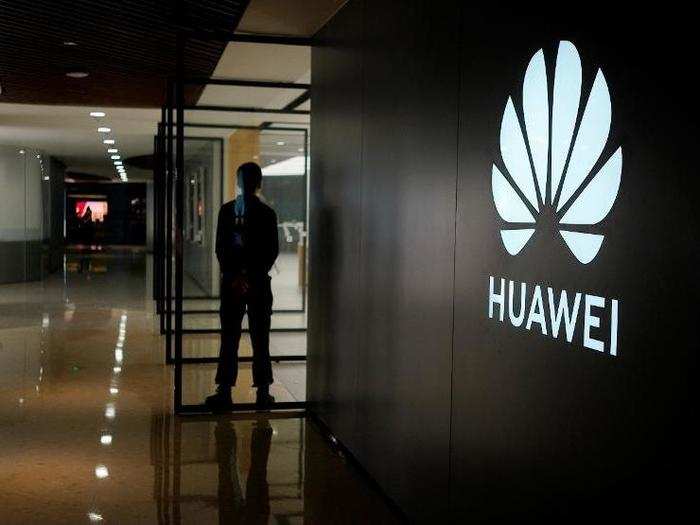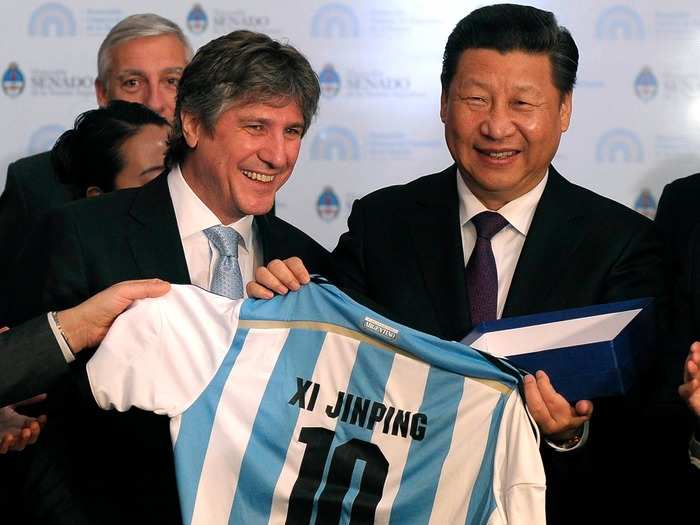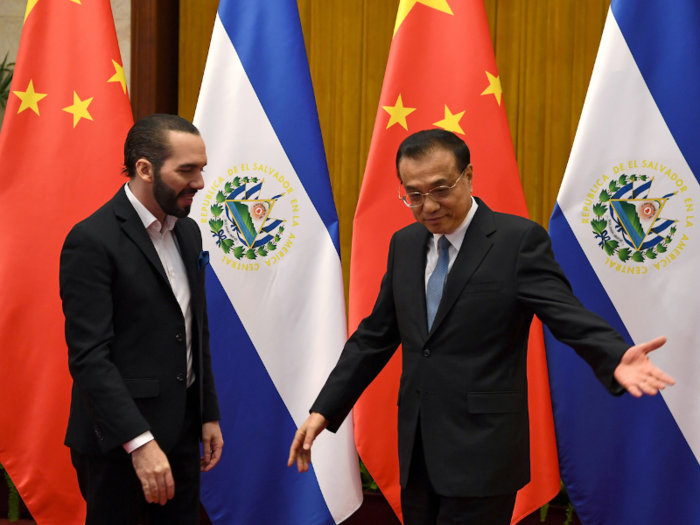- Home
- slideshows
- miscellaneous
- 4 ways China is gaining ground in Latin America, according to the US's top military commander in the region
4 ways China is gaining ground in Latin America, according to the US's top military commander in the region
Loans and leases

4 ways China is gaining ground in Latin America, according to the US's top military commander in the region

Faller declined to name that Caribbean country, but the terms he described sounded like those of a recent deal in Jamaica, according to Margaret Myers, director of the Asia and Latin America Program at the Inter-American Dialogue.
It's the job of the Defense Department to think about security issues and contingencies, and there are sovereignty concerns that arise from deals regarding land use, Myers said, "but there is some responsibility that needs to be placed on the Latin American countries."
"If a deal is negotiated, and it's negotiated well, and there are strong regulations in place to ensure sufficient accountability with respect to the environment, social issues, and sufficient gains economically, then China will abide by all of that," Myers added. "But all of this needs to be negotiated up front, and some governments ... continue not to be particularly well equipped to be able to negotiate effectively with China in this respect, or they just really need a deal."
"So much depends on the governments themselves and what they're willing to negotiate and what they're willing to give up," Myers said. "And that's where we get a wide range of outcomes in the types of deals that China has struck in the region."
China's effort to isolate Taiwan, which it considers a runaway province, have also played out in Latin America. El Salvador is one of several countries that have switched sides. There's overlap in what China is offering those new partners and what it's offering elsewhere, but its efforts to counter Taiwan "should be interpreted a bit separately from the rest of China's engagement in the region," Myers said.
IT infrastructure

The spread of Chinese IT infrastructure has attracted scrutiny because of concerns that Beijing could infiltrate or exploit it.
"If your IT infrastructure is state-owned — which all their companies, by law, the data will be state-owned — then how do we have the relationship where I can trust the exchange of that data with a partner?" Faller said.
"There are very frank conversations I've had with the military folks I deal with, but they're all subject to the same thing I am, [which] is policymakers and economic interests, so we have to come up with an alternative to that for the United States, and I know we're working real hard on that, but it can't come fast enough," Faller added, calling IT "the gateway to cyber."
The "tech element" is one that needs to be monitored, Myers said. "That I do see as a very critical development and one with potential and major security implications for the region."
Chinese telecommunications firm Huawei is the world's No. 1 telecom supplier and No. 2 phone maker, but the US has sought to block it from domestic networks and to keep other countries from dealing with it.
Myers said it wasn't clear to her if Chinese technologies were as vulnerable or compromised to the extent the US has suggested, but if they are, "that's a problem."
Nevertheless, Myers added, Huawei and other Chinese telecoms are still "very well positioned" to continue building networks in the region. "That's a real issue of concern, especially as the US engages with these countries, and it becomes a vulnerability also for the US."
Space

"China has invested heavily in space, and that includes moving into this area with space stations and equity in space stations in Argentina and Chile and elsewhere," Faller said.
"So when you see that, and people say, 'Well, they don't have physical presence in terms of naval bases.' Well, that's not really the game that's being played right now," Faller added. "That could come, and it could come pretty rapidly, but if you lock up space, you lock up IT, you lock up port access, you have leverage and information."
Faller's comments referred to the Chinese-built, military-run space station in Argentina's Patagonian region, which has a 16-story antenna but little transparency about its purpose or operations.
That facility "sure could have some implications for the US, especially as concerns surveillance of US space operations," Myers said. "There is very likely that capacity, and that base is run pretty much exclusively by China."
"There are some Argentines present evidently, but with this new administration, it's hard to know whether there will be much control over what's being done there," Myers added, referring to the government of President Alberto Fernandez, who took office on December 10.
Military aid and weapons systems

Chinese arms sales to the region are "not high," Faller said, totaling "about $615 million over the last five years or so," which he called "a soft figure."
"What's high is China's gifts of military stuff," like trucks and small boats, Faller added. "It's happening everywhere."
China is a relatively new entrant to the Latin American arms market; its conventional weapons are still just 3% of the North and South American arms imports. While Chinese weapons are usually cheaper than those of the US or Russia, Chinese defense sales to the region have expanded from small arms to more sophisticated systems including radars, armored personnel carriers, combat aircraft, and military ships.
Venezuela has been the largest buyer of Chinese arms in the region, though countries like Bolivia, Ecuador, and Peru are also significant clients.
Chinese military personnel have visited Venezuela, which has used its Chinese-made armored personnel carriers to repress protests. The Venezuelan military has also published photos of Chinese-made radar systems set up on Venezuelan bases.
China has "deployed some assets" to the region, Faller said, "and that's picked up consistently in the last couple years. They're also increasing their military engagement, Spanish-language schools, training, training centers, and gifting of gear to various countries."
Those gifts have grown "to the extent to which it undermines partnerships with the US" and "contributes to instability," Faller said.
Competition vs. conflict

The US military views the presence of China and others in the region through a security lens.
"They're there. They're present, and they're working for their national interests in ways that are 100% counter to long-term stability in the region and to our own," Faller said. "The future of this globe depends on how we can reconcile that competition, but right now, in this hemisphere, that competition is strong in the area of values and access and influence. It borders on conflict."
Strengthening partnerships is one way to counter that, Faller added, but there has to be "mutual benefit," including strong intelligence sharing and strong liaisons.
While there is "intense competition," China's goals are primarily economic and not necessarily aimed at diminishing US influence, "although some of the actions that China is taking may have that effect," Myers said.
In total, China-Latin America trade grew from $17 billion in 2002 to almost $306 billion in 2018, and President Xi Jinping has set a goal of increasing that to $500 billion by 2025.
China's aim in Latin America, as elsewhere, Myers said, is to make the environment more conducive to engagement where it has interests or a comparative advantage or seeks to gain an advantage.
Shaping that environment has entailed development assistance and diplomatic engagement with political figures, thinkers, and the general public. That does have implications for the US.
"Is it conflict? Is it bordering on conflict? ... I don't know that that's necessarily case," Myers said. "Could it become a conflict? Absolutely. I could see an escalation of tensions, but I think a lot of that might come from miscalculation from the United States."
Playing both sides and still losing

In past, countries in Latin America may have sensed they could benefit by playing the US and China against each other.
"But I don't think that's the sense anymore," Myers said. "More than anything now it's become very challenging to balance the two and to try to make everybody happy."
Myers pointed to El Salvador, which cut ties with Taiwan in August 2018 — adding to US ire over immigration — in hopes of an economic benefit from Beijing.
"But now what El Salvador has negotiated is essentially a few small examples of development assistance with China," Myer said. "They're not big projects, and one would hope that El Salvador might be able to gain a little bit more from having played that card."
Broadly speaking, the US and Latin American countries share many values, especially those related to civil liberties and democratic governance. Critics say China's governance model would undermine those principles. Concern about that is likely grow as Beijing's influence expands.
"I think the much more concerning element of this is Chinese influence over policymaking in a wide range of areas," Myers said.
"There is the prospect that if China is able to become a top economic partner for most countries in the region — and it already is for many — that it will have considerable influence or sway over policymaking, for example, in internet governance or in privacy-related regulations."
Concerns over Chinese technology already reflect Beijing's reputation as an exporter of methods to surveil or influence populations — Venezuela's "fatherland cards," developed with a Chinese company's help, are one local example.
Most countries in the region aren't legally permissive of that kind of technology, Myers said. "But if laws are adopted that create a better environment for use of Chinese technology, then that's all the better for China but not necessarily for people in Latin America."
Popular Right Now
Popular Keywords
Advertisement